- Home
- Kim Newman
The Man From the Diogenes Club Page 27
The Man From the Diogenes Club Read online
Page 27
Price shrugged. Richard saw through his gloom to dour Celtic triumph. The Inspector had been right to call the Diogenes Club. Now he could let them make the running.
Vanessa returned.
‘How did she do?’ Fred asked.
‘Stunning… marvellous… saucy,’ said Vanessa.
‘So much for the Grauniad,’ said Fred. ‘What would the News of the Screws say?’
‘“My Kinky Sex Hell With Jammy Jamie: Top Model Tells All – Exclusive!” She called her agent, and had him pass on a message to her lawyer. She knew just how much slap to put on for that tearful, yet glamorous look.’
‘Bless,’ said Richard.
‘Now what, guv?’ asked Fred.
‘You’re going to follow up the police cases. Go over the Disappearances, the Throat-Cuttings and Hepplethwaites. Plus anything else that turns up – my gut tells me there’ll be more. Vanessa, doll yourself down to mere gorgeousness so you can pass for a struggling actress and have Della’s agent get you an audition for this Barstows effort. Seems like they could do with a touch of metropolitan glamour. I will get up to speed on this apparently significant cultural phenomenon that has somehow managed to pass me by. It seems likely the programme is at least haunted and at worst cursed, so it behoves someone like us to investigate. Oh, wait a mo, I’ve just remembered, there isn’t anyone like us. We’re the only hope for a happy outcome. Any questions?’
Price, Fred and Vanessa were all about to speak.
‘No, I thought not,’ Richard said, hurriedly. ‘Let’s get cracking. Mysteries don’t solve themselves, chaps and chapesse.’
III.
‘When I were a lass, Brenda-girl,’ said Mavis Barstow, ever-accusing finger jabbing at her long-suffering daughter’s eye, frosted perm shaking with indignant fury, ‘times were ’ard… bloody ’ard.’
It was a familiar speech, delivered in an accent thick as a Yorkshire coal-seam or a Lancashire pie-crust without feeling bound to the specific vocal traits of any geographical county. The Barstows lived in Bleeds, an industrial stain on the misty moors of Northshire, a region impossible to locate on Ordnance Survey maps. In black-and-white, Mavis was resplendent in a sparkling jet-beaded ensemble over a blinding silver blouse. Her diamonds kept flashing under the studio lights. Richard assumed the idea was a low-budget, North of England Joan Crawford. The frankly frumpy Brenda, victim of many a cutting remark, wore a grey swirly minidress, and was self-conscious about her chubby knees.
‘We ’ad none o’ yer fancy edyecashun,’ continued Mavis, warming to a favourite subject, ‘an’ only a tart’d wear a frock like tha’, but we ’ad respect, Brenda-girl… bloody respect! I’ll hear no more o’ this tripe an’ onions about you gettin’ engaged to a sooty, cause ye’re no’ too grown-up to bare yer rump an’ get a stripin’ from yer da’s old miner’s belt.’
‘But, Mam,’ whined Brenda, who strangely had a Birmingham accent, ‘I’m with child!’
Mavis’s face set in the gargoyle snarl which always meant someone would suffer serious emotional or physical damage in the next episode. The theme tune cut in, an unacknowledged collaboration between the Brighouse and Rastrick Brass Band and the Pink Floyd. Credits slid across still photographs of slag-heaps, urchins and strikers from the 1930s. The Barstows had come a long way since then, though you’d not know it from listening to Mavis the Matriarch.
Richard was once held captive for three weeks by a scorpion cult who were practised in Black Acupuncture, the science of inflicting non-lethal but excruciating pain by applying venom-tipped needles to the nerve-endings. On another occasion, he had found it necessary to crawl through three miles of clogged-up Victorian sewer filth in order to throw off a determined shapeshifter who was on his scent. Not to mention a childhood spell in a Nazi extermination camp, traumatic enough to blank out any memory of whoever he had been before Captain Geoffrey Jeperson found him in the ruins of Europe and adopted him. But nothing in his experience was quite as agonising as a fortnight in the basement screening room of Amalgamated Rediffusion Television’s West London offices, watching episode after episode of The Northern Barstows. He would never hear that infernally memorable theme tune again without wincing.
Lady Damaris Gideon, MP, was on the ART board of directors, and owed a favour to the Diogenes Club. In 1928, Edwin Winthrop – Richard’s predecessor as Most Valued Member and sometime mentor – supervised a gruesome pest-control exercise at Gideon Towers, ridding caverns underneath the estate of a branch of the family who had practised obscene rites in the sixteenth century and degenerated into nastily toothy mole-folk. Thirty-five years on, no longer the ingénue who’d required rescuing from her many-times-removed cousins’ appalling larder, Lady Dee wore long sleeves to cover bite-marks and tinted contacts to conceal the pink, distinctive Gideon Eye. A tough-minded survivor of far more terrifying battles in business and politics, she was well up on the trouble in Northshire and was only too happy to dump the problem in someone else’s lap.
‘O’Dell-Squiers have their own fiefdom with that wretched programme,’ she had said, ‘and the Board would not be unhappy to see them taken down a peg, just so long as the unwashed keep watching the adverts.’
Having now seen their O’D-S logo over two hundred times, Richard knew O’Dell-Squiers made The Northern Barstows on behalf of ART, who syndicated it through the Independent Television network. The production company was owned by June O’Dell, the actress who played Mavis Barstow, and her ex-husband, Marcus Squiers, the writer who had ‘created’ the show.
Lady Dee was the only person Richard had run into on this case who wasn’t a Northern Barstows fan. In fact, the MP refused even to cast a cold, contemptuous Gideon Eye at anything broadcast by the company which paid her a fat salary plus dividends simply for gracing an annual meeting with her presence and a letterhead with her esteemed name. In what sounded like an uppercrust Mavis Barstow rant, she told him she loathed the wireless (‘especially those ghastly transistors’), despised television on principle (‘it’s for being interviewed on, not watching’), was iffy about talking pictures and none too sure if music halls should be allowed.
The most useful thing to come out of the meeting was that Lady Dee had put Richard in touch with Professor Barbara Corri, ‘this batty spinster from one of those plate-glass pretend-universities’. The Professor was infamous for pestering ART with questions about The Northern Barstows. The programme was her field of study, and she taught a course around it at the University of Brighton.
‘In my salad days at Shrewsbury,’ said Lady Dee, coming over Mavis again, ‘it was Greek and Latin, with a bare minimum of Shakespeare to satisfy the “moderns”. None of this rot you read in the Sundays about degrees in plays full of swearing or pop records by the Bootles. But she knows her onions, this Barbara Corri. If you absolutely have to find out about this dreadful thing, she’s your best bet. ART could scrape up a consultancy fee if needs be. We’ve an interest in settling this curse. Sir Joseph Keats was on the Board too. Is still, if he ever turns up alive.’
Among Professor Corri’s works was a paper in Television Monograph entitled ‘“Women of A Certain Age”: The Stereotyping of the Independent, Powerful Woman in British Television Serial Drama: Crossroads, The Northern Barstows, Coronation Street’. Richard tracked it down and did his best to understand the argument before phoning her and offering to spring for train tickets and accommodation over an unspecified period if she would pitch in on what he vaguely defined as ‘a research project’. The students were on vac, so she was available and had enthusiastically agreed to meet Richard at the ART offices.
He arrived first and waited in the company’s reception area, under a bank of photo-portraits of the company’s in-favour stars. Pride of place was given to a positively Queen Motherly, four-times-the-size-of-the-rest June O’Dell. A workman was replacing a scowling young man with a grinning, quiffed comedian. Richard considered the discarded picture.
‘That’s Donald Shale,’ said a woman who�
��d come in while he was pondering the brevity of fame in an age of mass communications. ‘“Jockie Gigglewhites”. Written out and gone from our screens. Typecast as a sadistic shrimp. Not good for long-term career prospects.’
Richard turned to meet Professor Corri, then mentally rebuked himself for subscribing to a stereotype of ‘women of a certain age’ just as set in stone as anyone else’s in ‘the dominant culture’. Lady Dee called Barbara Corri a ‘spinster’, which might technically be true in that she was past forty and unmarried. It wasn’t the label Richard would have applied. He would have inclined to something like ‘stunner’.
The Professor’s well-fitted mustard-and-cream trouser suit emphasised her womanly shape. A double rope of pearls circled her admirably swanlike neck. Her face was sculptured and cool, with symmetrical smile lines. She raised Queen Bee sunglasses, using them as an Alice band in her upswept auburn hair, and showed amused, sparkling light-hazel eyes. Male students with little interest in ‘Approaches to British Television Serial Drama’ must sign up for her course just to sit at the front and watch her suit stretch tighter as she stood on tiptoes to chalk up a reading list.
‘I really must thank you, Mr Jeperson,’ she said, shaking his hand with a good grip. She wore violet chamois gloves. ‘I’ve been trying to get in here for ages. You obviously know the magic words which open up the vaults.’
She offered him her arm, a curiously old-fashioned gesture, and proposed, ‘Shall we delve?’
IV.
Having spent two weeks in a darkened room steeped with Barbara Corri’s fragrance, Richard wished the flickering twaddle on the screen hadn’t been a distraction. However, without the waft of ylang-ylang and the delicate susurrus of the Professor’s rapider breath during ‘high-emotion’ moments, he’d have been driven to gnaw off his own arm by June O’Dell’s relentlessly strident Mavis, let alone the provincial stooges who came and went as the fortunes of the family rose and fell and rose and fell again.
Bleeds seemed bereft of a middle class. The characters – most related by blood, marriage or liaison – were either disgustingly rich and vulgar or appallingly poor and noble, sometimes shifting from one end of the socio-economic spectrum to the other within a few episodes. The show featured a strange meld of cartoonish social stratification and fractured time-space continuum. The haves lived in the highly coloured present, where floating walls were adorned with pop-art prints and dolly birds strutted in hot-from-Carnaby-Street fashions. The have-nots were stuck in a black-and-white Depression of an earlier decade or even – in the cobbles, fog and gaslight district – a bygone century.
After each episode, the lights came up and Professor Corri added footnotes while the desk-sized videotape-player cooled down and an archivist rewound the magnetic tape and stowed the fanbelt-sized spool.
‘“Brenda’s Black Baby” is the big plotline of 1969 to 1970,’ said the Professor. ‘It divided the country, played out over two whole years. It’s something only a soap can do, tackle story in real time. We see Brenda’s affair with Kenny Boko, a jazz musician who works in one of Cousin Dodgy Morrie’s nightclubs. She has to deal with a voodoo curse placed by Mama Cartouche, Kenny’s former girlfriend…’
For a moment, Richard was interested. Voodoo curses were in his usual line.
‘…then Mavis finds out, and is set against the relationship, as in the episode we’ve just seen. For a short time, Mavis becomes a pin-up for the National Front. They fight a Birmingham by-election using a Mavis quote, “No Daughter of Mine Would Marry a Bloody Darky”. Their vote share goes up, and for the first time in that constituency they don’t lose their deposit. But, over the months, Mavis comes to accept the situation, and delivers Baby Drum herself on Guy Fawkes Night, with fireworks in the background. The “Birth of Drum” episode was the first Barstows in colour. Sales of colour sets tripled in the weeks before the event.’
‘What happened to the baby? He’s not in the recent shows we’ve seen.’
‘Lost in an Andean plane crash with Brenda, when Karen Finch, the actress, was written out overnight. She had a salary dispute with O’Dell-Squiers and got unceremoniously dumped. Aside from O’Dell, Finch was the longest-lasting member of the original cast. And she doesn’t have a piece of the show. Rather a sad story, actually, Finch. Had a breakdown and went around saying she was “Brenda Barstow”, soliciting donations for a mission to rescue Baby Drum from South American cannibals. There’s a cruel instance of inter-textuality on Barstows as Mavis is strung along by a con-woman who claims to be Brenda, her face different thanks to plastic surgery, also running a bogus charity scam. Of course, this is where we came in. The vexed relationship between reality and fiction. Romans-à-clef are nothing new in serial drama, back to Dickens and Eugène Sue. People have been bringing suit or making complaint that this or that fictional character is a libellous version of themselves at least since Whistler forced George Du Maurier to rewrite Trilby to take out some digs at him. Sometimes, it seems our reality is a disguised version of The Northern Barstows rather than the other way round. The bogus Brenda is arrested and imprisoned before Karen Finch is taken to a secure hospital.’
‘Just like Delia and Della?’
‘That seems to be near-simultaneous, which goes beyond my idea of credible. Still, Marcus Squiers says every time he dreams up a storyline the rest of the writing staff pooh-pooh as beyond belief, he reads in the newspapers that the exact same thing is happening somewhere.’
‘An assassin in full Omar Sharif gear riding a camel into the Stock Exchange and slashing about himself with a scimitar?’
‘That’s one of the more extreme incidents.’
‘But there are more?’
‘Dozens. In the early days, when Barstows is squarely in the British realist tradition, it doesn’t happen much or at all. Mavis and the rest are metaphorically, and occasionally literally, incestuous. Storylines concentrate on the family and their dependants. Then, Barstow & Company become a power corporation and Mavis goes high society and mixes with government ministers, pop stars, sports celebrities and gangsters. Slightly disguised caricatures of well-known people are a major ingredient in the formula. Clive James says you’re not really famous until you’ve been misrepresented on The Northern Barstows, but of course they’ve never done him so that might be sour grapes. Then, as we know, Bleeds bleeds. Things happen on Barstows which then happen in real life. It’s a problem for me. My interest is in soap as representation, but it seems Barstows has stopped representing and started being. I’m not sure what discipline covers the situation now. Yours, probably.’
‘Mine, definitely.’
Barbara Corri had looked him up too, and had a fair idea of his discipline. The University of Brighton had its own two-man School of Parapsychology, where student volunteers took carefully measured doses of hallucinogen to open their third eyes and played with Rhine cards or tried to make hamster-wheels spin with the power of their minds. She had asked about Richard there, and her colleagues were impressed – not to mention murderously envious as only underfunded academics could be – that she was being seconded by the legendary Diogenes Club.
‘Shall we press on and look at the next episode?’
Two weeks ago, they had started with the original six-part drama from 1964, in which self-made rag trade millionairess Mavis Barstow coped with the sudden loss of her husband (‘Da’) and recriminations around the funeral led to an irreversible break-up of her extended family. The serial proved so popular that ART commissioned an ongoing series from O’Dell-Squiers, which meant the irreversible break-up turned out to be reversible after all. Richard had sampled episodes from different periods of the show. After looking at the recent storylines which paralleled the Hepplethwaites, Keats and Hassan cases, they had dipped back into the archive to view representative or significant episodes selected by Professor Corri to give a sense of the ‘evolving totality of Barstows’.
He put his hand on the Professor’s warm knee and shook his head.
/> ‘I think I’ve seen enough. My eyes have gone square and I can’t get Mavis’s voice out of my head when I try to sleep. This phase of the project is concluded.’
‘Where do you want to go from here, Richard?’
It was the first time she had used his first name. He had an impulse to take things from here in a direction entirely unconnected with the mystery. He recalled his duty and took back his hand, hoping he could sense in the Professor a response that should be filed away and dealt with later.
‘Barbara,’ he said, savouring the syllables, ‘I believe there is only one logical place to go. Bleeds, in Northshire.’
Her eyes were startled a moment, then she smiled, shocked to giggles.
‘Can I come too?’
‘I insist on it.’
‘What fun. I’m on sabbatical, so I’m yours for as long as you need me.’
He could not resist putting his hand back on Barbara’s knee.
‘Excellent,’ he said. ‘I’m sure you’ll come in handy. You can be my native guide in the jungles of… television.’
V.
‘Northshire’ was confined to Haslemere Studios, deep in the Home Counties. As a boy, Richard had assumed there was a connection between the Home Counties and the BBC’s Home Service. The cut-glass accent he had grown up speaking issued from both.
‘Semiologically, Surrey is more “Southern” than Brighton,’ observed Barbara as they drove past a road-sign indicating the turn-off for the studios. ‘The South Coast is southerly in a mere geographic sense. Haslemere is what Northerners mean when they talk about “the South”.’
Professor Corri was from Leicester, originally – which was neither up nor down. Like Richard, she spoke with an accent learned from the wireless and films with Celia Johnson. It struck him that in thirty years’ time everyone in the United Kingdom might speak like The Northern Barstows. He felt a chill in his bones.
‘To a world of bad faith and inauthenticity,’ he pronounced.

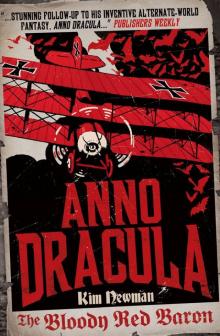 The Bloody Red Baron
The Bloody Red Baron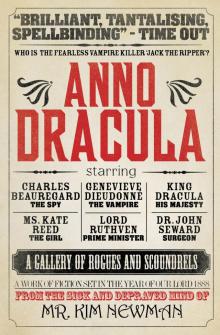 Anno Dracula
Anno Dracula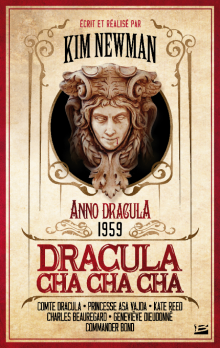 Dracula Cha Cha Cha
Dracula Cha Cha Cha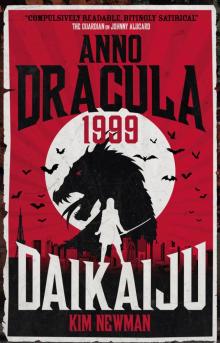 Anno Dracula 1999
Anno Dracula 1999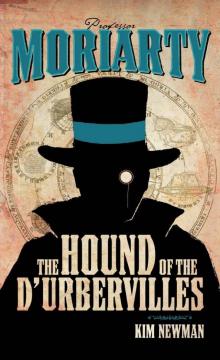 Moriarty: The Hound of the D'Urbervilles
Moriarty: The Hound of the D'Urbervilles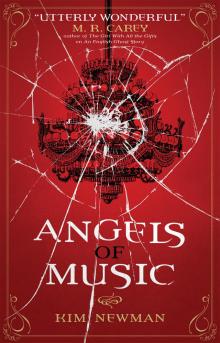 Angels of Music
Angels of Music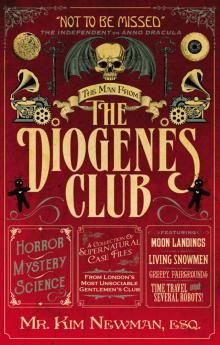 The Man From the Diogenes Club
The Man From the Diogenes Club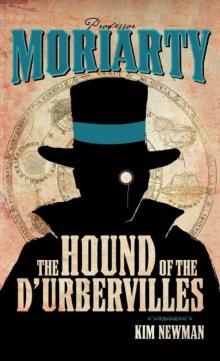 Professor Moriarty: The Hound Of The D’urbervilles
Professor Moriarty: The Hound Of The D’urbervilles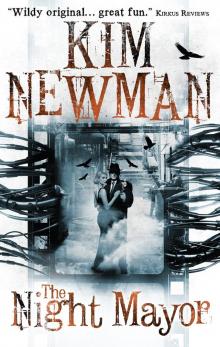 The Night Mayor
The Night Mayor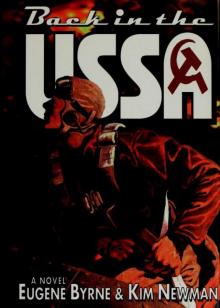 Back in the USSA
Back in the USSA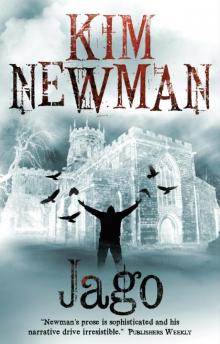 Jago
Jago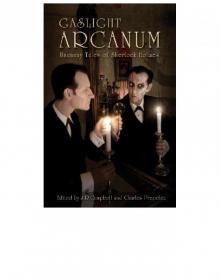 Gaslight Arcanum: Uncanny Tales of Sherlock Holmes
Gaslight Arcanum: Uncanny Tales of Sherlock Holmes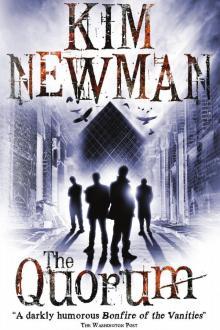 The Quorum
The Quorum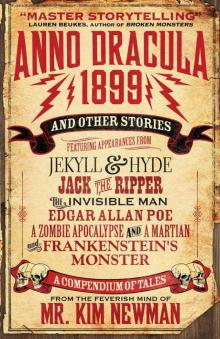 Anno Dracula 1899 and Other Stories
Anno Dracula 1899 and Other Stories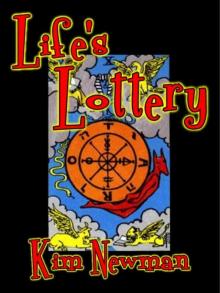 Life's Lottery
Life's Lottery The Secrets of Drearcliff Grange School
The Secrets of Drearcliff Grange School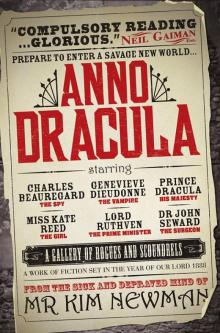 Anno Dracula ad-1
Anno Dracula ad-1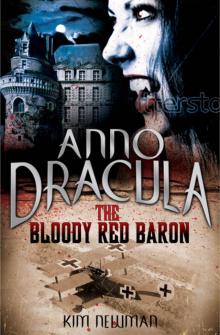 The Bloody Red Baron: 1918 ad-2
The Bloody Red Baron: 1918 ad-2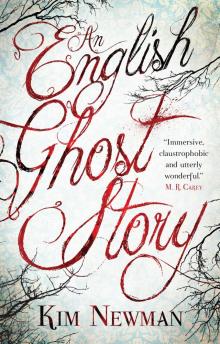 An English Ghost Story
An English Ghost Story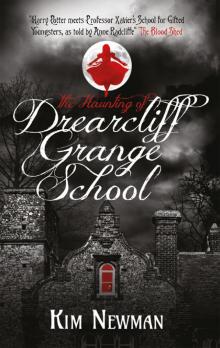 The Haunting of Drearcliff Grange School
The Haunting of Drearcliff Grange School The Other Side of Midnight
The Other Side of Midnight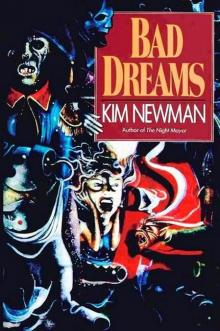 Bad Dreams
Bad Dreams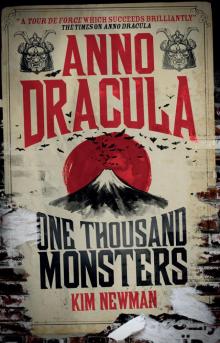 Anno Dracula--One Thousand Monsters
Anno Dracula--One Thousand Monsters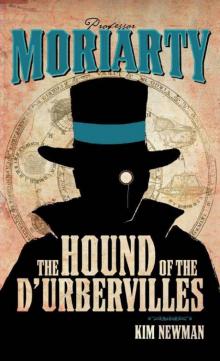 The Hound Of The D’urbervilles
The Hound Of The D’urbervilles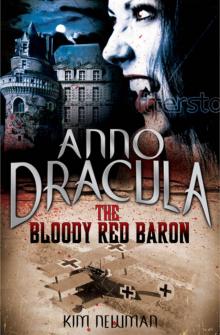 The Bloody Red Baron: Anno Dracula 1918
The Bloody Red Baron: Anno Dracula 1918